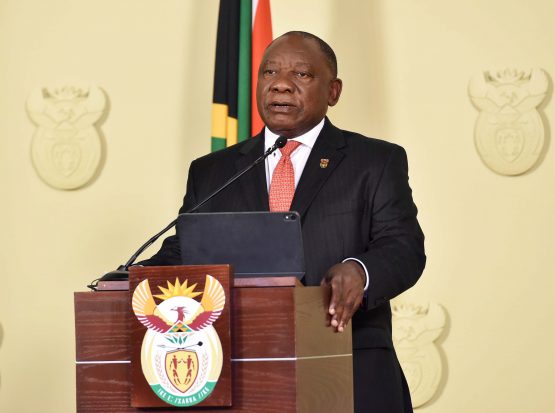Thebe Mabanga
President Cyril Ramaphosa announced R 500 billion, or 10% of South Africa’s GDP, in economic stimulus measures designed to shield the economy from the ravages of the spread of the novel Coronavirus and kick-start growth once the national lockdown is over and the pandemic eventually passes.
The money will come from R130 billion of reprioritised spending, while the balance will come from local and international sources including the Unemployment Insurance Fund, as well as Development Finance Institutions such as the World Bank, the International Monetary Fund (IMF), the New development Bank or BRICS Bank as well as the Africa Development Bank.
Ramaphosa started by acknowledging the disruptive nature of the lockdown but emphasised its importance.
“While the nation-wide lockdown is having a devastating effect on our economy, it is nothing compared to the catastrophic human, social and economic cost if the coronavirus could spread among our people unchecked.” Ramaphosa said.
COVID-19 is expected to have a devastating impact on the South African economy, possibly more severe than that 2008 Global Financial Crisis.
Some estimates now suggest that the economy may shrink by between 8% and 10% and lose a million jobs,
Ramaphosa characterised the measures as the second phase of the COVID-19 response designed to stabilise the economy, address the decline in demand and supply and protect jobs.
The stimulus measures include an extraordinary health budget, hunger and distress relief measures, support of companies and workers as well as reopening the economy
An amount of R20 billion has been allocated to fight the Coronavirus and this will be directed towards strengthening the public health system and support for frontline workers through the supply of protective personal equipment. There will also be increase in testing capacity
Another R20 billion is allocated to municipalities, who ordinarily receive less than 10% of nationally raised revenue.
This is aimed at helping them improve sanitation and provide food and shelter for the homeless.
There is also R50 billion Coronavirus grant. Child grants will be enhanced by up to R500 until October while other grants will be raised by R 250 per month.
There will also be a special grant of R350 for the unemployed who currently receive no social support.
Ramaphosa said government has set aside R 100 billion for protection and creation of jobs.
“By the end of today, the UIF’s special COVID-19 benefit has paid out R1.6-billion, assisting over 37 000 companies and 600 000 workers.” Ramaphosa said.
Overall, the UIF has set aside R40 billion has been set aside for income support payments for workers whose employers are not able to pay their wages.
There is also a R2 billion lifeline for SMMEs and Spaza shops while the Industrial Development Corporation’s has disbursed R162 million in funding or supporting companies that supplies COVID-19 related medical equipment.
Looking beyond the lockdown phase and the management of the health crisis, the President said revival of the economy will require Infrastructure spending, structural economic reforms, and the transformation of the economy.
Government will also introduce a R200 billion loan guarantee scheme for SMME.
This will be done in partnership with major banks and will cover operational costs. Government has previously used loan guarantee schemes to assists businesses, most notably through the Khula Fund.
The biggest challenge government faced was that banks would call in the guarantee at the first sign of trouble such as an SMME falling three months in arrears.
Government announced a four months holiday contribution for the skills development levy and refined the tax measured announced earlier, including raising the revenue threshold for companies that can defer Pay As You Earn Payments to R100 million.
Overall tax measures are expected to free up R70 billion cash-flow into the economy.
Iraj Abedian, CEO of Pan African Advisory and Research Services welcomed the measures, noting the fact that they are segmented into various phases and affect different areas of the economy.
“I also like the fact that the President is using the opportunity to address structural reforms of the economy” said Abedian, referring to the range of economic reforms that rating agencies have cited as a key reason for South Africa’s downgrade.
Examples of structural reforms include the supply of energy and the monopoly that Eskom enjoys in electricity supply instead if decentralised supply that allows a municipality to choose its electricity supplier.
Another frequently cited example is the release of spectrum licence to improve bandwidth for telecommunication services, a process delayed by over a decade and several communication minsters.
Relaxation of labour laws are another contentious area of reform.
Abedian notes that a challenge that government will face is implementation, which lies beyond Ramaphisa’s control.
“Implementation is the weak link of governance,” Abedian says noting that capacity of many institutions has been hollowed out over the past 15 years or more.
He also notes that “corrupt elements” in various parts of the system will see some of the proposed as “a once in a lifetime feeding through” and seek to exploit it. The two areas that he fears will be plagued by corruption are food parcel distributions as well as the spending by municipalities, although these are not the only areas to which corruption is confined.
Raymond Parsons of the North West University Business School describes the package as “a highly substantial raft of measures to assist the economy”.
“The economic decisions required … now need to enjoy the same degree of urgency as the public health decisions that have to be taken.” Parson said in a statement.
“The economic outlook for SA in 2020 is one of deep recession, business failures and rising unemployment.”
On re-opening of the economy, Ramaphosa said government will gradually lift restriction on economic activity, starting with an announcement on Thursday.



